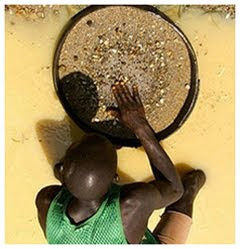Diamonds aren't a major reason for Africa's conflicts, and the Kimberley Process is no guarantee of a stone's pedigree in any case.

Associated Press
Naomi Campbell testifies at Charles Taylor's war crimes trial.
Thanks to Naomi Campbell's clueless testimony before the U.N. Special Court for Sierra Leone in The Hague, the manufactured nonscandal of "blood diamonds" is once again being trundled before the collective gullibility of the world.
The hoopla is over some diamonds that allegedly were given during a gala fund-raiser hosted by the sainted Nelson Mandela to Ms. Campbell by Charles Taylor, the apparently infatuated accused mass murderer and ex-president of Liberia (and erstwhile friend of Americans such as Jesse Jackson and Jimmy Carter).
U.K. supermodel Naomi Campbell told a war crimes court that she received a gift of "dirty-looking stones" that she assumed were from Liberia's Charles Taylor. Video courtesy of Sky News.
But despite what much media coverage would have you believe, the parallel occurrences of diamonds and internecine mayhem in Africa are in no way related—certainly no more than are violence and any other commercial commodity found on the continent. When was the last time we heard of "blood manganese," or "blood copper," or, for that matter, "blood bananas" or "blood cut flowers"?
The fact is that most African diamonds are produced in places that are reasonably-to-perfectly peaceful (such as Botswana, Namibia and South Africa), whereas there are murderous African conflicts that rage elsewhere without the slightest "assistance" from diamonds (such as Rwanda, Uganda and the Sudan).
Alas, this simple truth is no match for the combined forces of liberal guilt and the commercial interests of a few players in the diamond industry. So the "blood diamond" charade has marched on unimpeded, passing through Congress (where I testified about the absurdity of the whole notion 10 years ago), through Hollywood in the hands of Leonardo DiCaprio (in "Blood Diamond"), and most recently last week with a supermodel's testimony in The Hague about her "dirty pebbles." In this faux-morality play, everyone has an assigned role:
• Cover-seeking panjandrums of the diamond industry—egged on by the canny PR spinners at DeBeers. The latter's main interest is in eliminating independent diamond production. But the campaign against "blood diamonds" is eagerly latched onto by many others in the industry who see any intergovernmental anti-"blood diamond" scheme, no matter how unworkable or feckless, as an opportunity to reap respectability and goodwill.
• Cynical NGO charlatans who know a good racket when they've stumbled on one, and who know that emotive images of amputees and child soldiers, when pictured (no matter how incongruously or unjustifiably) beside diamond-bedecked Naomi Campbell types, will prove irresistible to the unknowing public.
• Venal politicians on every continent, who will leap onto any bandwagon that provides a vehicle for cheap moral preening.
The result of this toxic mixture of ignorance, conscience-lining and moral hucksterism is something called the "Kimberley Process." This Inspector Clouseau-like agglomeration of squabbling national boards and committees attempts to identify and guarantee the provenance of every diamond in the world—a task as hopeless as trying to identify the lineage of every dollar bill in circulation.
The accuracy and validity of a particular diamond's "birth certificate" lasts exactly as long as it takes for that diamond to join one other single diamond or parcel of diamonds. In the course of being bought and sold, rough diamonds can be—and are—thrown together like blended coffee beans, thereby completely losing their "lineage." Thus, it is quite common for an international diamond dealer to buy a parcel of rough diamonds from, say, a Canadian mine, another from diggers in the Congo, and another from DeBeers in London (which itself has already mixed its diamonds from its suppliers in various countries), re-sort the mixed whole, and then sell small lots from that larger "mix" to individual diamond cutters.
In this situation, is it remotely plausible that a diamond cutter could certify from which country a particular stone has emanated? And this scenario doesn't even begin to apply to an utterly anonymous, changed-beyond-all-recognition, cut diamond that a "civilian" will buy in a jewelry store.
In short, diamonds have no legally dispositive geographical DNA. As I believe they say on 47th Street, "fuggeddabahdit."
To the extent that this intercontinental tail-chasing of a "Kimberley Process" results in anything at all (other than the moral salving of the consciences of the world's bien-pensants), it is to diminish the desperately needed revenue of those who are most courageous and blameless in the entire diamond pipeline—i.e., the independent, artisanal local diggers in Africa (and to a lesser extent, in South America).
If the campaigns of groups like Global Witness result in any fewer sales of diamonds from Sierra Leone, Liberia or the Congo, it will not diminish the income of Harry Winston or Cartier or Bulgari, nor of Africa's "Big Men," whether in presidential palaces or rebel redoubts. The only loser would be the poor devil in torn shorts and flip-flops on a muddy riverbed with a shovel and a wheelbarrow, who, if he knew what was being done supposedly in his name, would not be grateful in the slightest.
Wherever outside intervention has succeeded in ending carnage in Africa, it certainly hasn't been because of any fall in diamond sales. Rather, it has been thanks to the discreet and efficient armed intercession of Western special forces—the British in Sierra Leone, the Americans in Liberia, and the French elsewhere.
But back to the ongoing "blood diamond" soap opera: Just what was Charles Taylor doing as an invited guest in Nelson Mandela's house in 1997? Well, never mind.
Mr. Jolis is an independent rough-diamond consultant. He is an American based in Europe and has worked for many years throughout Africa.
By JACK JOLIS











